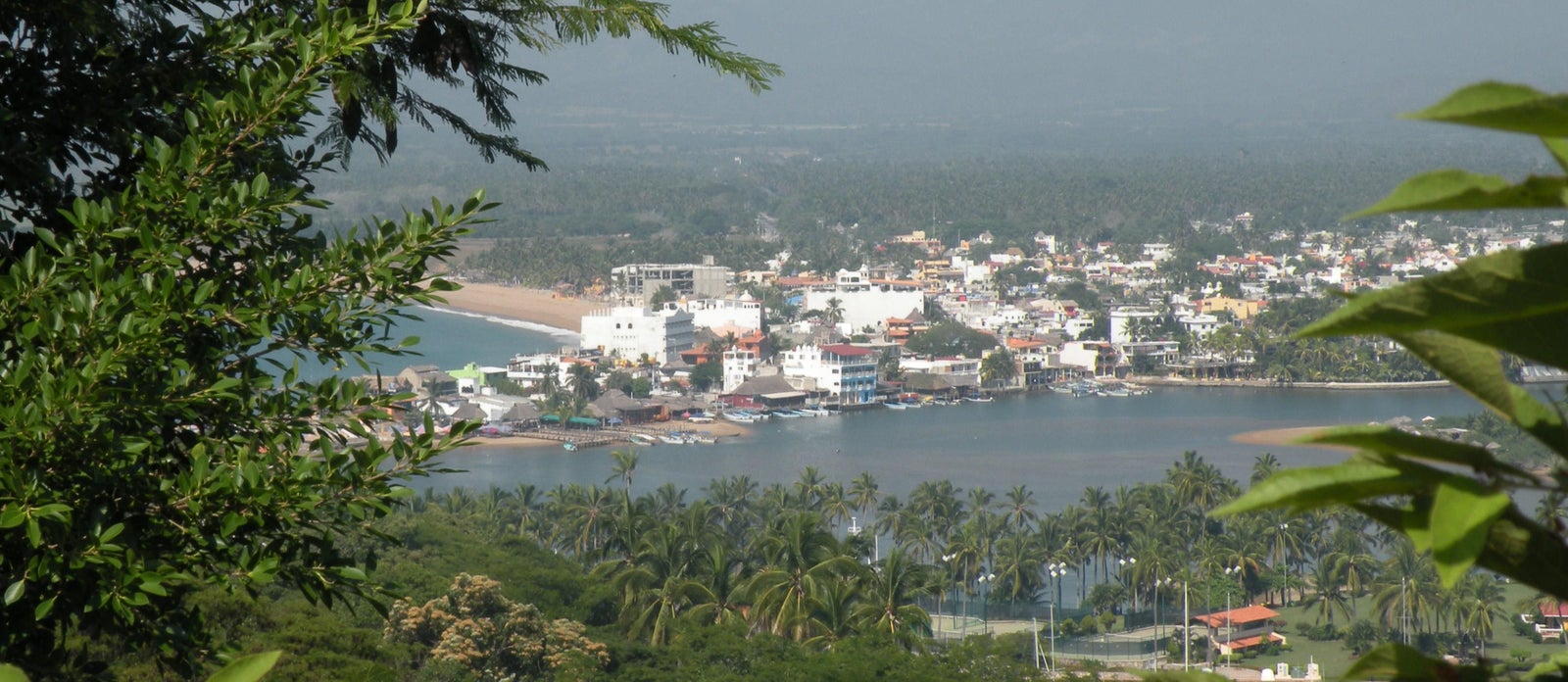
Americans, Canadians, Europeans and any other foreigners can own property in Mexico Territory. foreigners may obtain direct ownership of property in any city, town or zone in the interior of Mexico except in those areas of zones defined as "Restricted Zones".
RESTRICTED ZONES
Restricted zones are those located within 100 kilometers (about 62 miles) from any Mexican border, and within 50 kilometers (about 31 miles) from the coastline. In these zones, foreigners cannot have direct ownership of real estate as the Mexican Constitution prohibits it. However, if a foreigner wants to buy a property in a " Restricted zone", the Mexican government created the " Fideicomiso" (fee-day-co-me-so) which is translated as a " Real Estate Trust".
FIDEICOMISO
The fideicomiso is a trust created for the benefit of a foreign buyer, executed between a Bank in Mexico and the seller of a property in a restricted zone. The bank acts on behalf of a foreign buyer, taking title to real property. The bank as the trustee, buys the property for the foreigner, then, has a fiduciary obligation to follow the instructions of the foreigner who is the beneficiary of the trust. The trust beneficiary retains and enjoys all the rights of ownership while the bank holds title property. The foreigner is entitled to use, enjoy or profit from the property and also sell or rent it at its market value to any other eligible buyer for a period of 50 years. If the beneficiary does not sell the property to another buyer, he can renew his trust for another 50 year period or he can will the trust to any member of his family. The Mexican law defines "use" and " exploitation " (profit) as the right to use or possess a property including its fruits, products, or any revenue that results from its operation and exploitation by third parties or from a trust bank.
The beneficiaries of the trust (fideicomiso) can be; mexican Corporations, Foreign Individuals legal entities.
SPECIAL REQUIREMENTS
In order to allow foreigners to enter into an agreement to buy a property, the Mexican government requires all foreigners to apply and obtain a special permit from the Ministry of Foreign Affairs prior to the acquisition of the real estate. This is currently done by the trust bank at the time a real estate trust is set up in the case of properties in the restricted zones. The Ministry of Foreign Affairs may grant any petition for a trust permit that complies with the stipulations and requirements within 5 working days following the date of the presentation in the central office of the Ministry of Foreign Affairs in Mexico City. If the application is submitted to one of the Ministry state offices or Mexican Consulates, it will be granted in a period of 30 days. If the maximum period passes with no action by thr Ministry, the trust permit or registration is considered authorized.
REAL ESTATE TRANSACTIONS
Normally there are three players involved in any real estate transaction inside a restricted zone:
a) A real estate company
b) A bank
c) A public Notary
The Notario Publico (Public Notary) is an important entity in the process of buying a property. The Notary Public is an attorney authorized by the government to give legal advice in all real estate transactions. The Public Notary is a person with enough legal experience and is the only one that will determine if the transaction can be carried out under the Mexican laws and regulations. Also a Public Notary will determine closing costs, tax considerations for the buyer and seller.
The notary does a number of jobs in regard to the transfer of the property. He does not do everything that you want or think important. Ask questions about what the notary job covers and does not cover in the transfer of property. "Assuming" will get you in trouble. You will need to provide the notary with the information he requires to start the permit and closing process. You will need to pay him a deposit, usually half of the estimated cost, to start the process.
The notary's office will notify the parties when you are ready to close. You will need to pay at closing the balance of the closing costs due the notary. The total closing costs can be 5-10% of the purchase price, depending on the prices of the government fees and the amount of the transfer tax. You will be working off of an estimated closing cost statement until you receive the final one, which should be current as of the day of closing. You should receive a formal receipt of payment from the notary for these expenses.
The seller will owe fees such as commissions, bank trust cancellation fees, and capital gains, if due. If someone is on their toes, they will check to be sure that the seller is current with all utility payments. If you have negotiated that the phone line in your purchase price, the seller will need to give you certain documentation to present to Telmex in order to get the line transferrred. The notary in Jalisco is required to verify that the water bill and property taxes have been paid. A no-gravamen certificate should be provided which states there are no liens of record on the property. This certificate is good for only a short period of time, and can be expired if the closing takes too long to be completed. A new one will need to be issued. The appraisal for tax purposes is good for a certain period of time only before it needs to be re-order.
At closing, the seller or his representative should sign the escritura in front of the notary, thereby transferring the property. There should be present a translator to explain in English, or the primary language of the principals, what the escritura says. The buyer is not always required to be present or to sign at closing. Until the bank trustees sign the escritura, the transfer is not complete and cannot be recorded. The seller expects the balance of his net proceeds to be given to him on closing. The disbursement letter is actually a consolidation of the buyer's money and the seller's expenses paid from these funds. The net amount is what the seller should receive. As a buyer, you can request the notary to hold the escritura until the seller confirms the funds, which you have sent to him.
You or your representative will receive a copy of the new escritura at the notary's office at closing. The completed, recorded escritura will take weeks or months to be returned, with the additional back pages of seals and signatures from the government authorities. Remember that the copy you receive from the notary's office the signing is not the complete escritura. The notary will hold the original deed at his office until you or someone authorized by you in writing, receives the document. You should keep the original escritura in a safe place. You can have certified copies made to use when you have to conduct business that requires proof your Mexican residence.
If you own property in Mexico, an FM3 visa will establish the property as your declared residence. To meet the requirements for avoidance of capital gains when selling, you must have an Fm3 or Fm2 with the address of your residence, listed as your Mexican residence. (Check regulations for 2008)
Be sure you pay your taxes every January and your banktrust fee the month it becomes due. The date on the escritura establishes the date when the yearly fee is due and payable. Dont expect to receive a bill in the mail to remind you to pay of these fees. It is your responsibility to go to the tax office or bank and make your payment.
Enjoy your purchase!!!
RESTRICTED ZONES
Restricted zones are those located within 100 kilometers (about 62 miles) from any Mexican border, and within 50 kilometers (about 31 miles) from the coastline. In these zones, foreigners cannot have direct ownership of real estate as the Mexican Constitution prohibits it. However, if a foreigner wants to buy a property in a " Restricted zone", the Mexican government created the " Fideicomiso" (fee-day-co-me-so) which is translated as a " Real Estate Trust".
FIDEICOMISO
The fideicomiso is a trust created for the benefit of a foreign buyer, executed between a Bank in Mexico and the seller of a property in a restricted zone. The bank acts on behalf of a foreign buyer, taking title to real property. The bank as the trustee, buys the property for the foreigner, then, has a fiduciary obligation to follow the instructions of the foreigner who is the beneficiary of the trust. The trust beneficiary retains and enjoys all the rights of ownership while the bank holds title property. The foreigner is entitled to use, enjoy or profit from the property and also sell or rent it at its market value to any other eligible buyer for a period of 50 years. If the beneficiary does not sell the property to another buyer, he can renew his trust for another 50 year period or he can will the trust to any member of his family. The Mexican law defines "use" and " exploitation " (profit) as the right to use or possess a property including its fruits, products, or any revenue that results from its operation and exploitation by third parties or from a trust bank.
The beneficiaries of the trust (fideicomiso) can be; mexican Corporations, Foreign Individuals legal entities.
SPECIAL REQUIREMENTS
In order to allow foreigners to enter into an agreement to buy a property, the Mexican government requires all foreigners to apply and obtain a special permit from the Ministry of Foreign Affairs prior to the acquisition of the real estate. This is currently done by the trust bank at the time a real estate trust is set up in the case of properties in the restricted zones. The Ministry of Foreign Affairs may grant any petition for a trust permit that complies with the stipulations and requirements within 5 working days following the date of the presentation in the central office of the Ministry of Foreign Affairs in Mexico City. If the application is submitted to one of the Ministry state offices or Mexican Consulates, it will be granted in a period of 30 days. If the maximum period passes with no action by thr Ministry, the trust permit or registration is considered authorized.
REAL ESTATE TRANSACTIONS
Normally there are three players involved in any real estate transaction inside a restricted zone:
a) A real estate company
b) A bank
c) A public Notary
The Notario Publico (Public Notary) is an important entity in the process of buying a property. The Notary Public is an attorney authorized by the government to give legal advice in all real estate transactions. The Public Notary is a person with enough legal experience and is the only one that will determine if the transaction can be carried out under the Mexican laws and regulations. Also a Public Notary will determine closing costs, tax considerations for the buyer and seller.
The notary does a number of jobs in regard to the transfer of the property. He does not do everything that you want or think important. Ask questions about what the notary job covers and does not cover in the transfer of property. "Assuming" will get you in trouble. You will need to provide the notary with the information he requires to start the permit and closing process. You will need to pay him a deposit, usually half of the estimated cost, to start the process.
The notary's office will notify the parties when you are ready to close. You will need to pay at closing the balance of the closing costs due the notary. The total closing costs can be 5-10% of the purchase price, depending on the prices of the government fees and the amount of the transfer tax. You will be working off of an estimated closing cost statement until you receive the final one, which should be current as of the day of closing. You should receive a formal receipt of payment from the notary for these expenses.
The seller will owe fees such as commissions, bank trust cancellation fees, and capital gains, if due. If someone is on their toes, they will check to be sure that the seller is current with all utility payments. If you have negotiated that the phone line in your purchase price, the seller will need to give you certain documentation to present to Telmex in order to get the line transferrred. The notary in Jalisco is required to verify that the water bill and property taxes have been paid. A no-gravamen certificate should be provided which states there are no liens of record on the property. This certificate is good for only a short period of time, and can be expired if the closing takes too long to be completed. A new one will need to be issued. The appraisal for tax purposes is good for a certain period of time only before it needs to be re-order.
At closing, the seller or his representative should sign the escritura in front of the notary, thereby transferring the property. There should be present a translator to explain in English, or the primary language of the principals, what the escritura says. The buyer is not always required to be present or to sign at closing. Until the bank trustees sign the escritura, the transfer is not complete and cannot be recorded. The seller expects the balance of his net proceeds to be given to him on closing. The disbursement letter is actually a consolidation of the buyer's money and the seller's expenses paid from these funds. The net amount is what the seller should receive. As a buyer, you can request the notary to hold the escritura until the seller confirms the funds, which you have sent to him.
You or your representative will receive a copy of the new escritura at the notary's office at closing. The completed, recorded escritura will take weeks or months to be returned, with the additional back pages of seals and signatures from the government authorities. Remember that the copy you receive from the notary's office the signing is not the complete escritura. The notary will hold the original deed at his office until you or someone authorized by you in writing, receives the document. You should keep the original escritura in a safe place. You can have certified copies made to use when you have to conduct business that requires proof your Mexican residence.
If you own property in Mexico, an FM3 visa will establish the property as your declared residence. To meet the requirements for avoidance of capital gains when selling, you must have an Fm3 or Fm2 with the address of your residence, listed as your Mexican residence. (Check regulations for 2008)
Be sure you pay your taxes every January and your banktrust fee the month it becomes due. The date on the escritura establishes the date when the yearly fee is due and payable. Dont expect to receive a bill in the mail to remind you to pay of these fees. It is your responsibility to go to the tax office or bank and make your payment.
Enjoy your purchase!!!

